Business Law: Implied and Apparent Authority in Agency
VerifiedAdded on 2021/05/30
|10
|2258
|65
Report
AI Summary
This business law assignment analyzes the concepts of agency authority, specifically focusing on implied and apparent authority within the context of agent-principal relationships. The report examines the legal principles governing these authorities, referencing key cases like Watteau v Fenwick and Freeman and Lockyer v Buckhurst Park Properties. It explores the duties and liabilities of agents, including the duty of skill and care, and the potential liabilities of the principal. The assignment addresses issues of breach of warranty of authority and the remedies available in cases of apparent authority, such as ratification. The report applies these legal principles to a case study involving a band manager and a collectible guitar, providing a practical understanding of agency law's application.
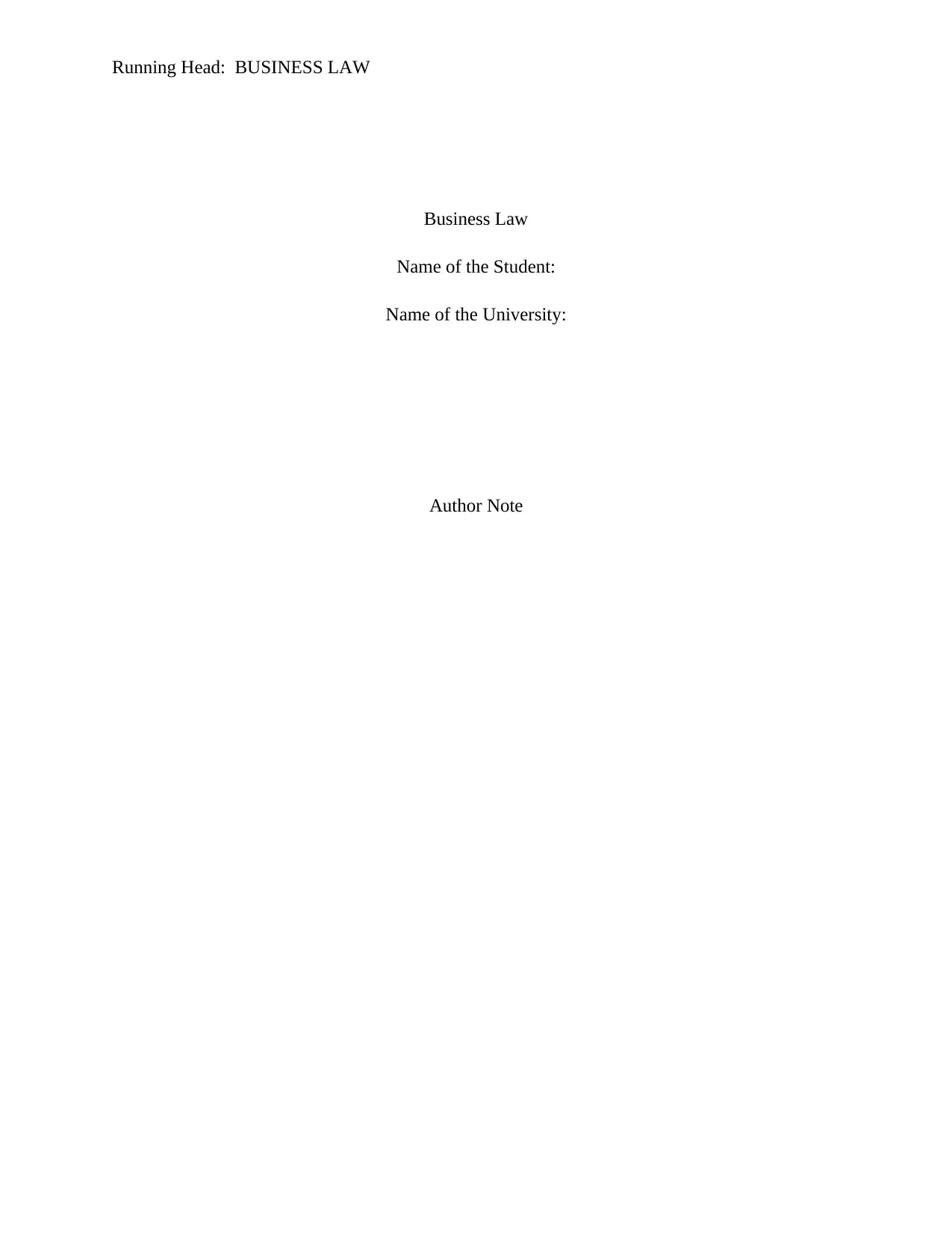
Running Head: BUSINESS LAW
Business Law
Name of the Student:
Name of the University:
Author Note
Business Law
Name of the Student:
Name of the University:
Author Note
Paraphrase This Document
Need a fresh take? Get an instant paraphrase of this document with our AI Paraphraser
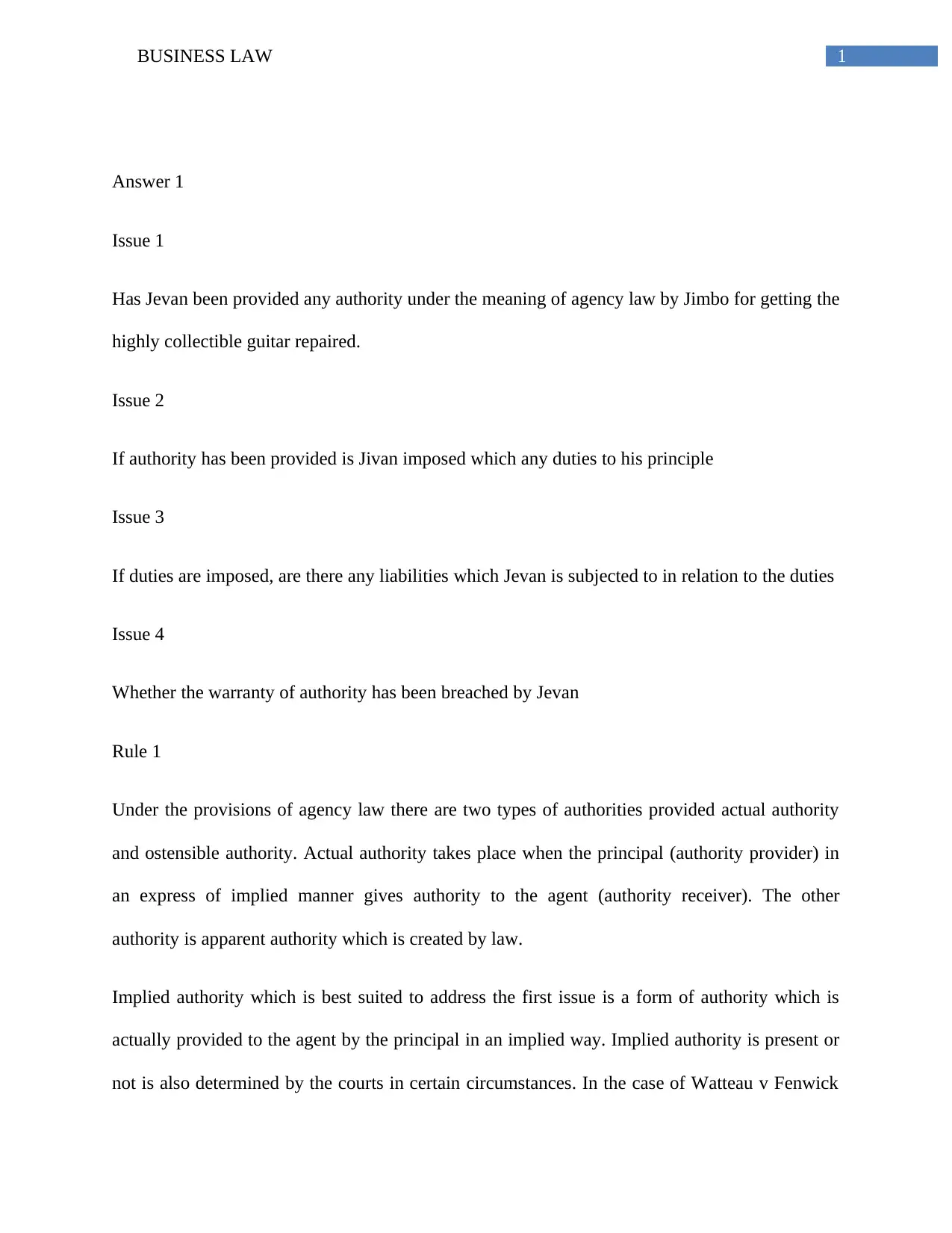
1BUSINESS LAW
Answer 1
Issue 1
Has Jevan been provided any authority under the meaning of agency law by Jimbo for getting the
highly collectible guitar repaired.
Issue 2
If authority has been provided is Jivan imposed which any duties to his principle
Issue 3
If duties are imposed, are there any liabilities which Jevan is subjected to in relation to the duties
Issue 4
Whether the warranty of authority has been breached by Jevan
Rule 1
Under the provisions of agency law there are two types of authorities provided actual authority
and ostensible authority. Actual authority takes place when the principal (authority provider) in
an express of implied manner gives authority to the agent (authority receiver). The other
authority is apparent authority which is created by law.
Implied authority which is best suited to address the first issue is a form of authority which is
actually provided to the agent by the principal in an implied way. Implied authority is present or
not is also determined by the courts in certain circumstances. In the case of Watteau v Fenwick
Answer 1
Issue 1
Has Jevan been provided any authority under the meaning of agency law by Jimbo for getting the
highly collectible guitar repaired.
Issue 2
If authority has been provided is Jivan imposed which any duties to his principle
Issue 3
If duties are imposed, are there any liabilities which Jevan is subjected to in relation to the duties
Issue 4
Whether the warranty of authority has been breached by Jevan
Rule 1
Under the provisions of agency law there are two types of authorities provided actual authority
and ostensible authority. Actual authority takes place when the principal (authority provider) in
an express of implied manner gives authority to the agent (authority receiver). The other
authority is apparent authority which is created by law.
Implied authority which is best suited to address the first issue is a form of authority which is
actually provided to the agent by the principal in an implied way. Implied authority is present or
not is also determined by the courts in certain circumstances. In the case of Watteau v Fenwick
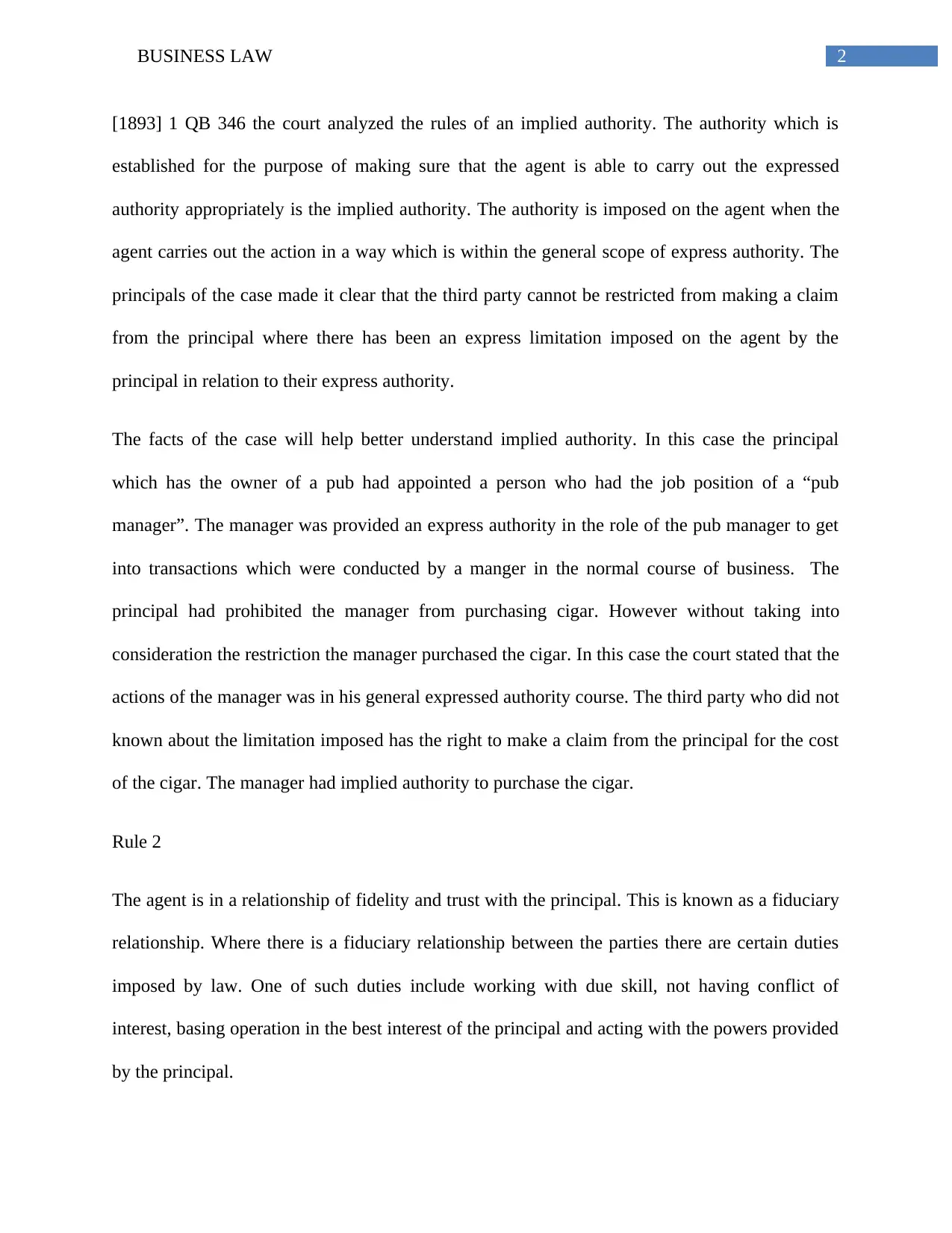
2BUSINESS LAW
[1893] 1 QB 346 the court analyzed the rules of an implied authority. The authority which is
established for the purpose of making sure that the agent is able to carry out the expressed
authority appropriately is the implied authority. The authority is imposed on the agent when the
agent carries out the action in a way which is within the general scope of express authority. The
principals of the case made it clear that the third party cannot be restricted from making a claim
from the principal where there has been an express limitation imposed on the agent by the
principal in relation to their express authority.
The facts of the case will help better understand implied authority. In this case the principal
which has the owner of a pub had appointed a person who had the job position of a “pub
manager”. The manager was provided an express authority in the role of the pub manager to get
into transactions which were conducted by a manger in the normal course of business. The
principal had prohibited the manager from purchasing cigar. However without taking into
consideration the restriction the manager purchased the cigar. In this case the court stated that the
actions of the manager was in his general expressed authority course. The third party who did not
known about the limitation imposed has the right to make a claim from the principal for the cost
of the cigar. The manager had implied authority to purchase the cigar.
Rule 2
The agent is in a relationship of fidelity and trust with the principal. This is known as a fiduciary
relationship. Where there is a fiduciary relationship between the parties there are certain duties
imposed by law. One of such duties include working with due skill, not having conflict of
interest, basing operation in the best interest of the principal and acting with the powers provided
by the principal.
[1893] 1 QB 346 the court analyzed the rules of an implied authority. The authority which is
established for the purpose of making sure that the agent is able to carry out the expressed
authority appropriately is the implied authority. The authority is imposed on the agent when the
agent carries out the action in a way which is within the general scope of express authority. The
principals of the case made it clear that the third party cannot be restricted from making a claim
from the principal where there has been an express limitation imposed on the agent by the
principal in relation to their express authority.
The facts of the case will help better understand implied authority. In this case the principal
which has the owner of a pub had appointed a person who had the job position of a “pub
manager”. The manager was provided an express authority in the role of the pub manager to get
into transactions which were conducted by a manger in the normal course of business. The
principal had prohibited the manager from purchasing cigar. However without taking into
consideration the restriction the manager purchased the cigar. In this case the court stated that the
actions of the manager was in his general expressed authority course. The third party who did not
known about the limitation imposed has the right to make a claim from the principal for the cost
of the cigar. The manager had implied authority to purchase the cigar.
Rule 2
The agent is in a relationship of fidelity and trust with the principal. This is known as a fiduciary
relationship. Where there is a fiduciary relationship between the parties there are certain duties
imposed by law. One of such duties include working with due skill, not having conflict of
interest, basing operation in the best interest of the principal and acting with the powers provided
by the principal.
⊘ This is a preview!⊘
Do you want full access?
Subscribe today to unlock all pages.

Trusted by 1+ million students worldwide
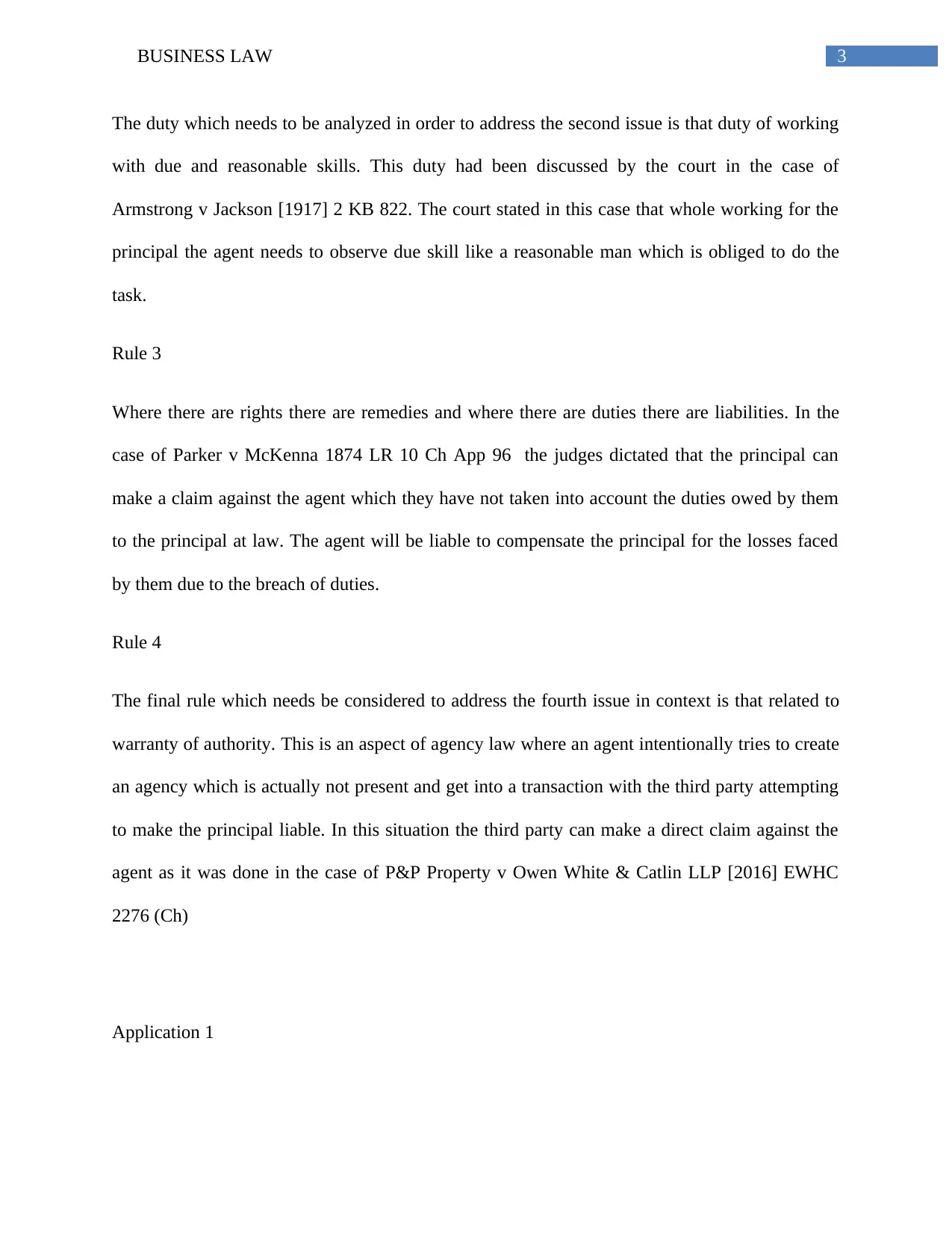
3BUSINESS LAW
The duty which needs to be analyzed in order to address the second issue is that duty of working
with due and reasonable skills. This duty had been discussed by the court in the case of
Armstrong v Jackson [1917] 2 KB 822. The court stated in this case that whole working for the
principal the agent needs to observe due skill like a reasonable man which is obliged to do the
task.
Rule 3
Where there are rights there are remedies and where there are duties there are liabilities. In the
case of Parker v McKenna 1874 LR 10 Ch App 96 the judges dictated that the principal can
make a claim against the agent which they have not taken into account the duties owed by them
to the principal at law. The agent will be liable to compensate the principal for the losses faced
by them due to the breach of duties.
Rule 4
The final rule which needs be considered to address the fourth issue in context is that related to
warranty of authority. This is an aspect of agency law where an agent intentionally tries to create
an agency which is actually not present and get into a transaction with the third party attempting
to make the principal liable. In this situation the third party can make a direct claim against the
agent as it was done in the case of P&P Property v Owen White & Catlin LLP [2016] EWHC
2276 (Ch)
Application 1
The duty which needs to be analyzed in order to address the second issue is that duty of working
with due and reasonable skills. This duty had been discussed by the court in the case of
Armstrong v Jackson [1917] 2 KB 822. The court stated in this case that whole working for the
principal the agent needs to observe due skill like a reasonable man which is obliged to do the
task.
Rule 3
Where there are rights there are remedies and where there are duties there are liabilities. In the
case of Parker v McKenna 1874 LR 10 Ch App 96 the judges dictated that the principal can
make a claim against the agent which they have not taken into account the duties owed by them
to the principal at law. The agent will be liable to compensate the principal for the losses faced
by them due to the breach of duties.
Rule 4
The final rule which needs be considered to address the fourth issue in context is that related to
warranty of authority. This is an aspect of agency law where an agent intentionally tries to create
an agency which is actually not present and get into a transaction with the third party attempting
to make the principal liable. In this situation the third party can make a direct claim against the
agent as it was done in the case of P&P Property v Owen White & Catlin LLP [2016] EWHC
2276 (Ch)
Application 1
Paraphrase This Document
Need a fresh take? Get an instant paraphrase of this document with our AI Paraphraser
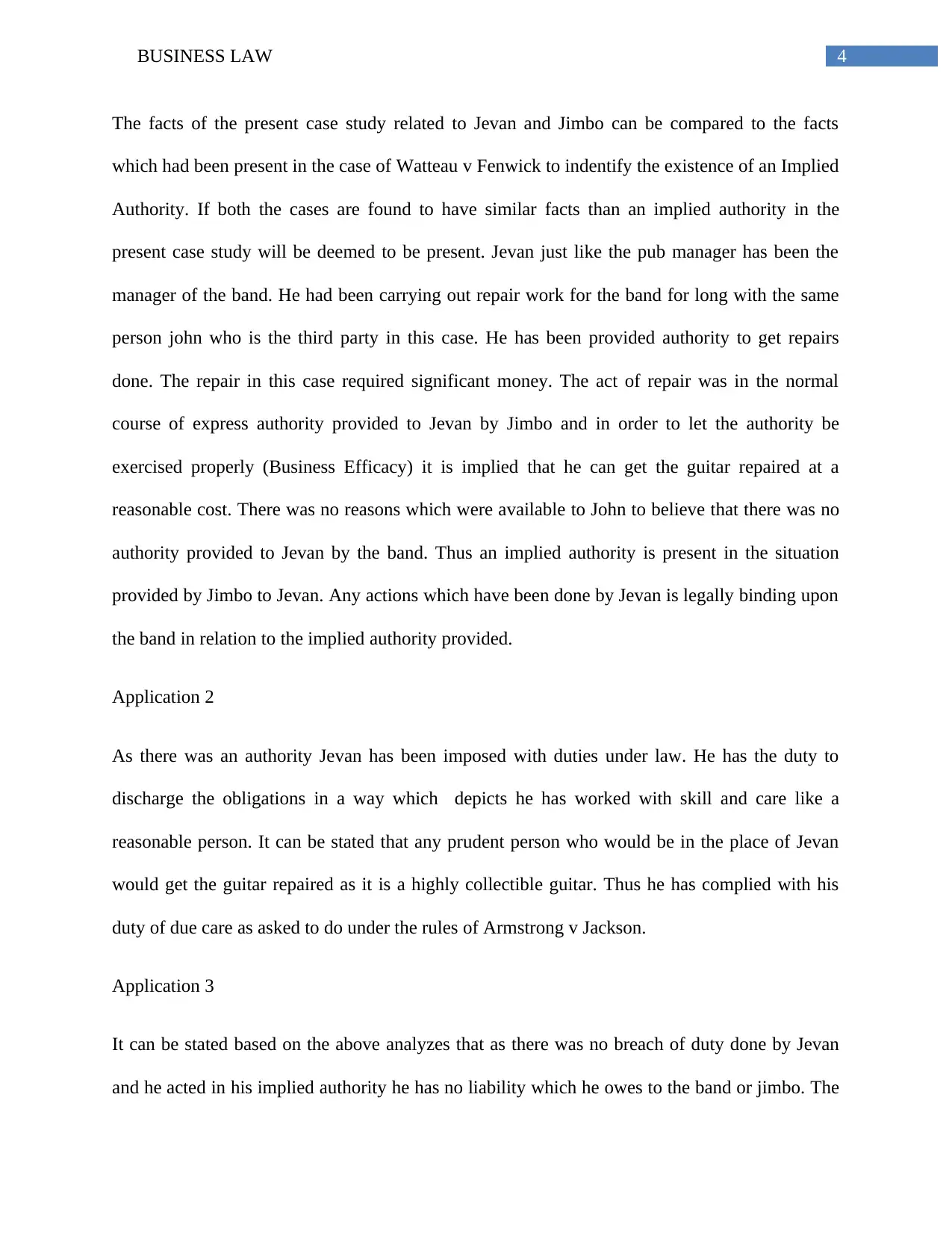
4BUSINESS LAW
The facts of the present case study related to Jevan and Jimbo can be compared to the facts
which had been present in the case of Watteau v Fenwick to indentify the existence of an Implied
Authority. If both the cases are found to have similar facts than an implied authority in the
present case study will be deemed to be present. Jevan just like the pub manager has been the
manager of the band. He had been carrying out repair work for the band for long with the same
person john who is the third party in this case. He has been provided authority to get repairs
done. The repair in this case required significant money. The act of repair was in the normal
course of express authority provided to Jevan by Jimbo and in order to let the authority be
exercised properly (Business Efficacy) it is implied that he can get the guitar repaired at a
reasonable cost. There was no reasons which were available to John to believe that there was no
authority provided to Jevan by the band. Thus an implied authority is present in the situation
provided by Jimbo to Jevan. Any actions which have been done by Jevan is legally binding upon
the band in relation to the implied authority provided.
Application 2
As there was an authority Jevan has been imposed with duties under law. He has the duty to
discharge the obligations in a way which depicts he has worked with skill and care like a
reasonable person. It can be stated that any prudent person who would be in the place of Jevan
would get the guitar repaired as it is a highly collectible guitar. Thus he has complied with his
duty of due care as asked to do under the rules of Armstrong v Jackson.
Application 3
It can be stated based on the above analyzes that as there was no breach of duty done by Jevan
and he acted in his implied authority he has no liability which he owes to the band or jimbo. The
The facts of the present case study related to Jevan and Jimbo can be compared to the facts
which had been present in the case of Watteau v Fenwick to indentify the existence of an Implied
Authority. If both the cases are found to have similar facts than an implied authority in the
present case study will be deemed to be present. Jevan just like the pub manager has been the
manager of the band. He had been carrying out repair work for the band for long with the same
person john who is the third party in this case. He has been provided authority to get repairs
done. The repair in this case required significant money. The act of repair was in the normal
course of express authority provided to Jevan by Jimbo and in order to let the authority be
exercised properly (Business Efficacy) it is implied that he can get the guitar repaired at a
reasonable cost. There was no reasons which were available to John to believe that there was no
authority provided to Jevan by the band. Thus an implied authority is present in the situation
provided by Jimbo to Jevan. Any actions which have been done by Jevan is legally binding upon
the band in relation to the implied authority provided.
Application 2
As there was an authority Jevan has been imposed with duties under law. He has the duty to
discharge the obligations in a way which depicts he has worked with skill and care like a
reasonable person. It can be stated that any prudent person who would be in the place of Jevan
would get the guitar repaired as it is a highly collectible guitar. Thus he has complied with his
duty of due care as asked to do under the rules of Armstrong v Jackson.
Application 3
It can be stated based on the above analyzes that as there was no breach of duty done by Jevan
and he acted in his implied authority he has no liability which he owes to the band or jimbo. The
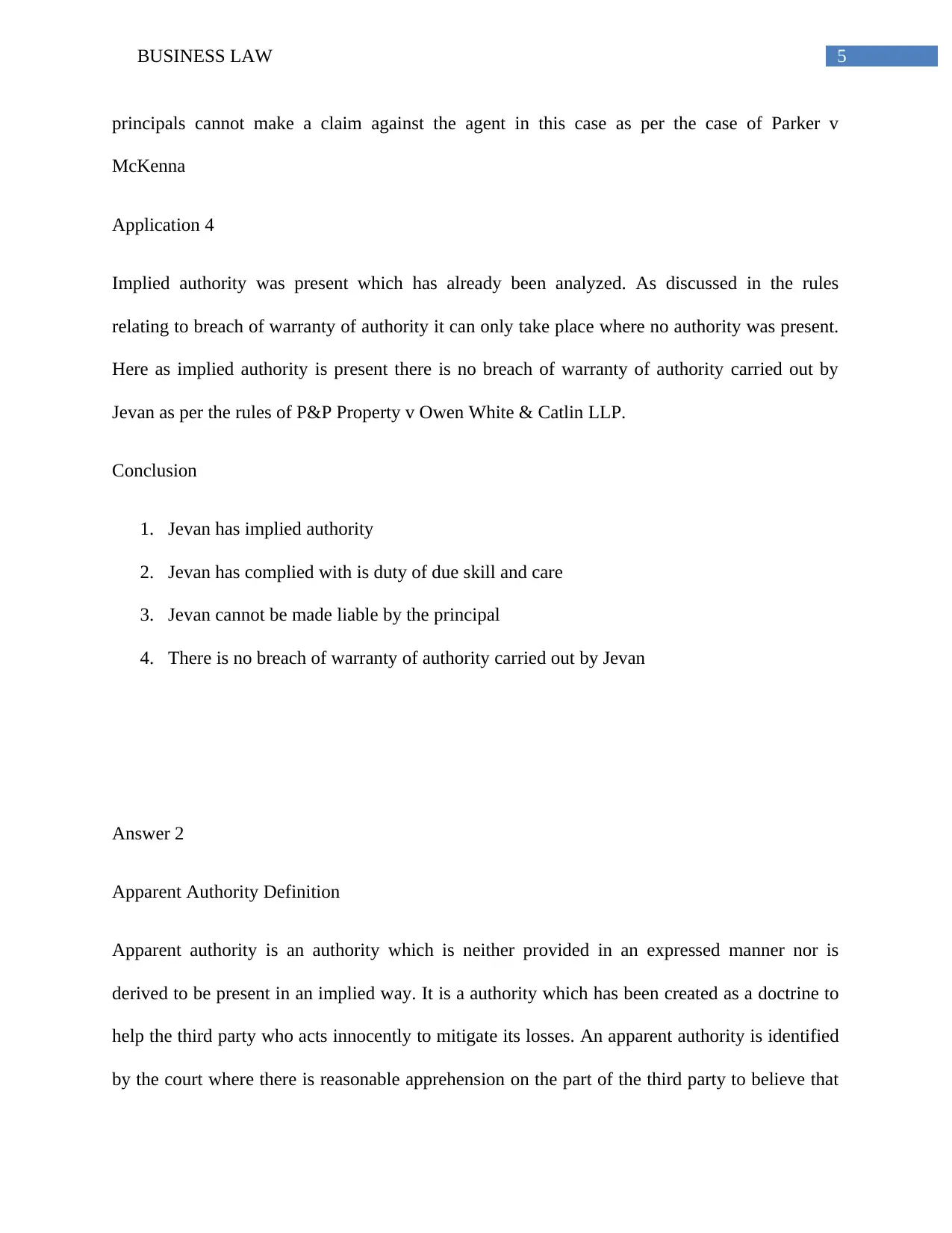
5BUSINESS LAW
principals cannot make a claim against the agent in this case as per the case of Parker v
McKenna
Application 4
Implied authority was present which has already been analyzed. As discussed in the rules
relating to breach of warranty of authority it can only take place where no authority was present.
Here as implied authority is present there is no breach of warranty of authority carried out by
Jevan as per the rules of P&P Property v Owen White & Catlin LLP.
Conclusion
1. Jevan has implied authority
2. Jevan has complied with is duty of due skill and care
3. Jevan cannot be made liable by the principal
4. There is no breach of warranty of authority carried out by Jevan
Answer 2
Apparent Authority Definition
Apparent authority is an authority which is neither provided in an expressed manner nor is
derived to be present in an implied way. It is a authority which has been created as a doctrine to
help the third party who acts innocently to mitigate its losses. An apparent authority is identified
by the court where there is reasonable apprehension on the part of the third party to believe that
principals cannot make a claim against the agent in this case as per the case of Parker v
McKenna
Application 4
Implied authority was present which has already been analyzed. As discussed in the rules
relating to breach of warranty of authority it can only take place where no authority was present.
Here as implied authority is present there is no breach of warranty of authority carried out by
Jevan as per the rules of P&P Property v Owen White & Catlin LLP.
Conclusion
1. Jevan has implied authority
2. Jevan has complied with is duty of due skill and care
3. Jevan cannot be made liable by the principal
4. There is no breach of warranty of authority carried out by Jevan
Answer 2
Apparent Authority Definition
Apparent authority is an authority which is neither provided in an expressed manner nor is
derived to be present in an implied way. It is a authority which has been created as a doctrine to
help the third party who acts innocently to mitigate its losses. An apparent authority is identified
by the court where there is reasonable apprehension on the part of the third party to believe that
⊘ This is a preview!⊘
Do you want full access?
Subscribe today to unlock all pages.

Trusted by 1+ million students worldwide
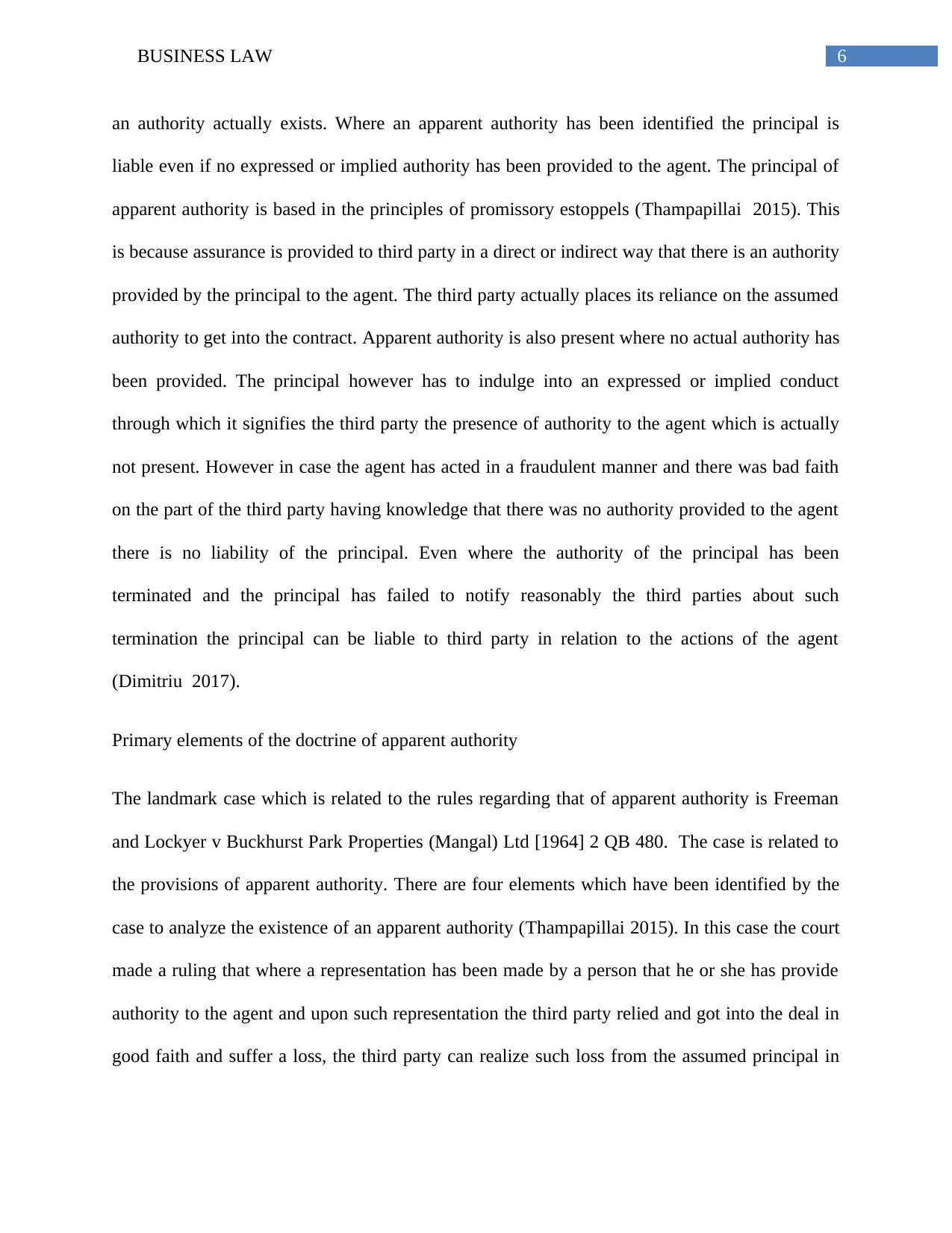
6BUSINESS LAW
an authority actually exists. Where an apparent authority has been identified the principal is
liable even if no expressed or implied authority has been provided to the agent. The principal of
apparent authority is based in the principles of promissory estoppels (Thampapillai 2015). This
is because assurance is provided to third party in a direct or indirect way that there is an authority
provided by the principal to the agent. The third party actually places its reliance on the assumed
authority to get into the contract. Apparent authority is also present where no actual authority has
been provided. The principal however has to indulge into an expressed or implied conduct
through which it signifies the third party the presence of authority to the agent which is actually
not present. However in case the agent has acted in a fraudulent manner and there was bad faith
on the part of the third party having knowledge that there was no authority provided to the agent
there is no liability of the principal. Even where the authority of the principal has been
terminated and the principal has failed to notify reasonably the third parties about such
termination the principal can be liable to third party in relation to the actions of the agent
(Dimitriu 2017).
Primary elements of the doctrine of apparent authority
The landmark case which is related to the rules regarding that of apparent authority is Freeman
and Lockyer v Buckhurst Park Properties (Mangal) Ltd [1964] 2 QB 480. The case is related to
the provisions of apparent authority. There are four elements which have been identified by the
case to analyze the existence of an apparent authority (Thampapillai 2015). In this case the court
made a ruling that where a representation has been made by a person that he or she has provide
authority to the agent and upon such representation the third party relied and got into the deal in
good faith and suffer a loss, the third party can realize such loss from the assumed principal in
an authority actually exists. Where an apparent authority has been identified the principal is
liable even if no expressed or implied authority has been provided to the agent. The principal of
apparent authority is based in the principles of promissory estoppels (Thampapillai 2015). This
is because assurance is provided to third party in a direct or indirect way that there is an authority
provided by the principal to the agent. The third party actually places its reliance on the assumed
authority to get into the contract. Apparent authority is also present where no actual authority has
been provided. The principal however has to indulge into an expressed or implied conduct
through which it signifies the third party the presence of authority to the agent which is actually
not present. However in case the agent has acted in a fraudulent manner and there was bad faith
on the part of the third party having knowledge that there was no authority provided to the agent
there is no liability of the principal. Even where the authority of the principal has been
terminated and the principal has failed to notify reasonably the third parties about such
termination the principal can be liable to third party in relation to the actions of the agent
(Dimitriu 2017).
Primary elements of the doctrine of apparent authority
The landmark case which is related to the rules regarding that of apparent authority is Freeman
and Lockyer v Buckhurst Park Properties (Mangal) Ltd [1964] 2 QB 480. The case is related to
the provisions of apparent authority. There are four elements which have been identified by the
case to analyze the existence of an apparent authority (Thampapillai 2015). In this case the court
made a ruling that where a representation has been made by a person that he or she has provide
authority to the agent and upon such representation the third party relied and got into the deal in
good faith and suffer a loss, the third party can realize such loss from the assumed principal in
Paraphrase This Document
Need a fresh take? Get an instant paraphrase of this document with our AI Paraphraser
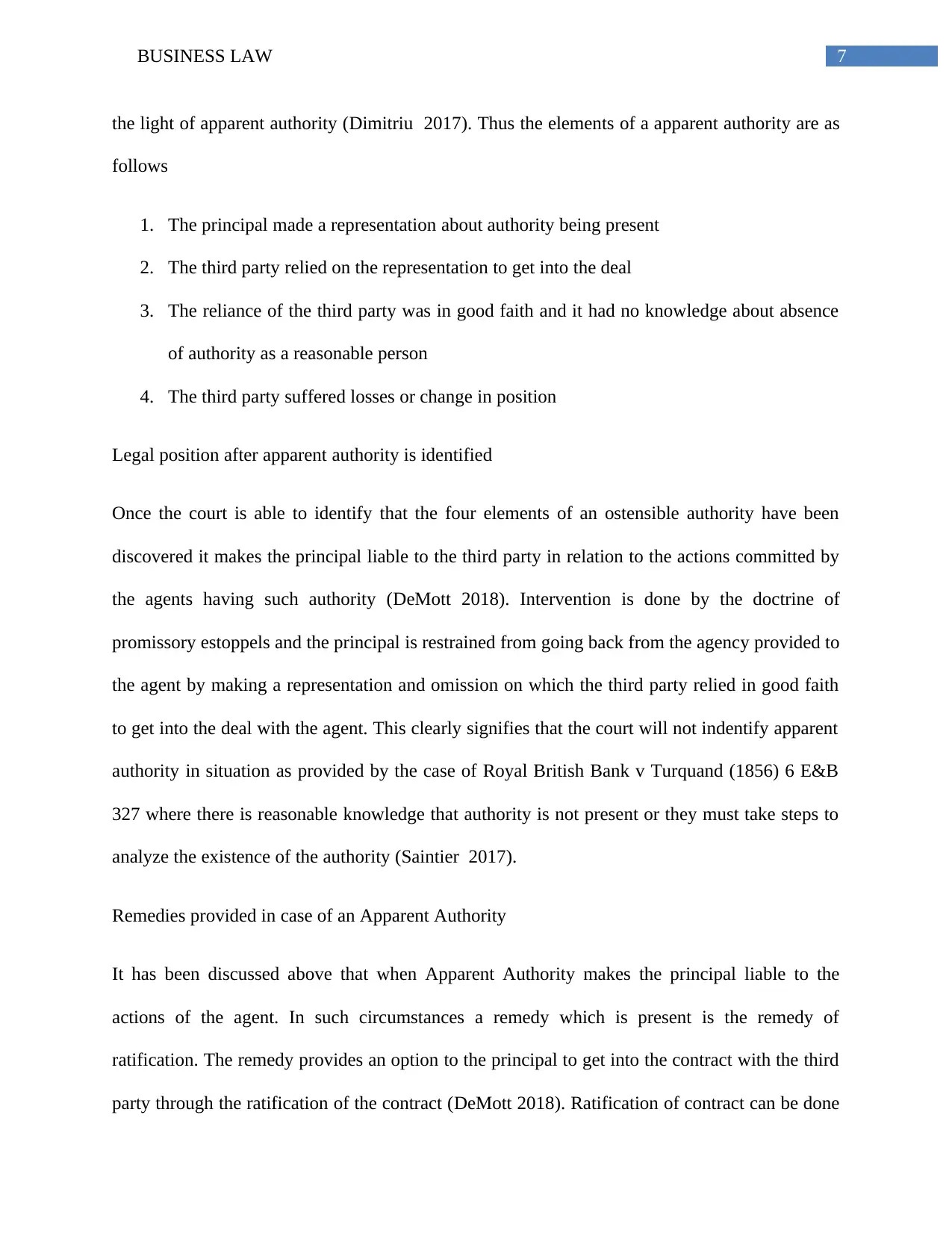
7BUSINESS LAW
the light of apparent authority (Dimitriu 2017). Thus the elements of a apparent authority are as
follows
1. The principal made a representation about authority being present
2. The third party relied on the representation to get into the deal
3. The reliance of the third party was in good faith and it had no knowledge about absence
of authority as a reasonable person
4. The third party suffered losses or change in position
Legal position after apparent authority is identified
Once the court is able to identify that the four elements of an ostensible authority have been
discovered it makes the principal liable to the third party in relation to the actions committed by
the agents having such authority (DeMott 2018). Intervention is done by the doctrine of
promissory estoppels and the principal is restrained from going back from the agency provided to
the agent by making a representation and omission on which the third party relied in good faith
to get into the deal with the agent. This clearly signifies that the court will not indentify apparent
authority in situation as provided by the case of Royal British Bank v Turquand (1856) 6 E&B
327 where there is reasonable knowledge that authority is not present or they must take steps to
analyze the existence of the authority (Saintier 2017).
Remedies provided in case of an Apparent Authority
It has been discussed above that when Apparent Authority makes the principal liable to the
actions of the agent. In such circumstances a remedy which is present is the remedy of
ratification. The remedy provides an option to the principal to get into the contract with the third
party through the ratification of the contract (DeMott 2018). Ratification of contract can be done
the light of apparent authority (Dimitriu 2017). Thus the elements of a apparent authority are as
follows
1. The principal made a representation about authority being present
2. The third party relied on the representation to get into the deal
3. The reliance of the third party was in good faith and it had no knowledge about absence
of authority as a reasonable person
4. The third party suffered losses or change in position
Legal position after apparent authority is identified
Once the court is able to identify that the four elements of an ostensible authority have been
discovered it makes the principal liable to the third party in relation to the actions committed by
the agents having such authority (DeMott 2018). Intervention is done by the doctrine of
promissory estoppels and the principal is restrained from going back from the agency provided to
the agent by making a representation and omission on which the third party relied in good faith
to get into the deal with the agent. This clearly signifies that the court will not indentify apparent
authority in situation as provided by the case of Royal British Bank v Turquand (1856) 6 E&B
327 where there is reasonable knowledge that authority is not present or they must take steps to
analyze the existence of the authority (Saintier 2017).
Remedies provided in case of an Apparent Authority
It has been discussed above that when Apparent Authority makes the principal liable to the
actions of the agent. In such circumstances a remedy which is present is the remedy of
ratification. The remedy provides an option to the principal to get into the contract with the third
party through the ratification of the contract (DeMott 2018). Ratification of contract can be done
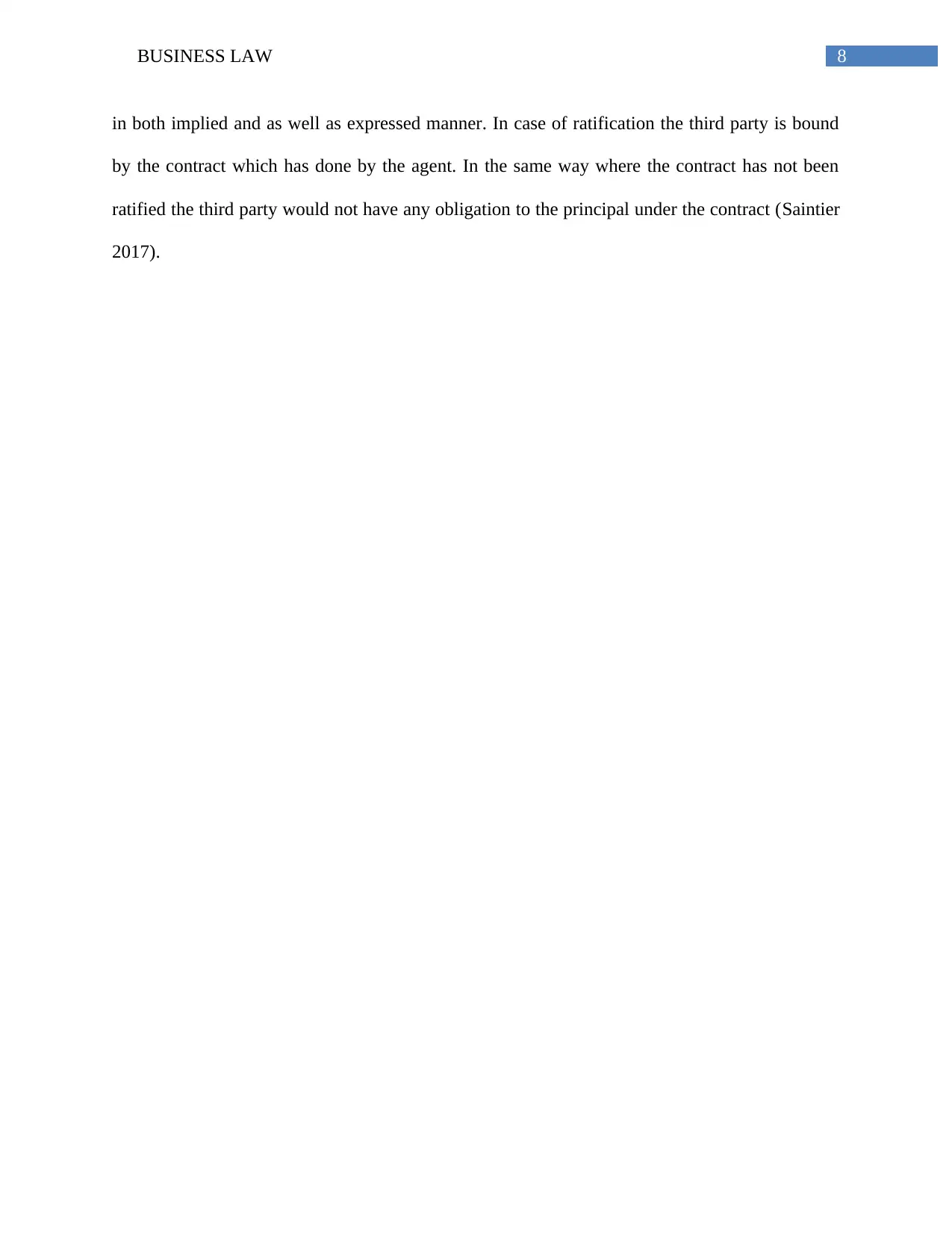
8BUSINESS LAW
in both implied and as well as expressed manner. In case of ratification the third party is bound
by the contract which has done by the agent. In the same way where the contract has not been
ratified the third party would not have any obligation to the principal under the contract (Saintier
2017).
in both implied and as well as expressed manner. In case of ratification the third party is bound
by the contract which has done by the agent. In the same way where the contract has not been
ratified the third party would not have any obligation to the principal under the contract (Saintier
2017).
⊘ This is a preview!⊘
Do you want full access?
Subscribe today to unlock all pages.

Trusted by 1+ million students worldwide
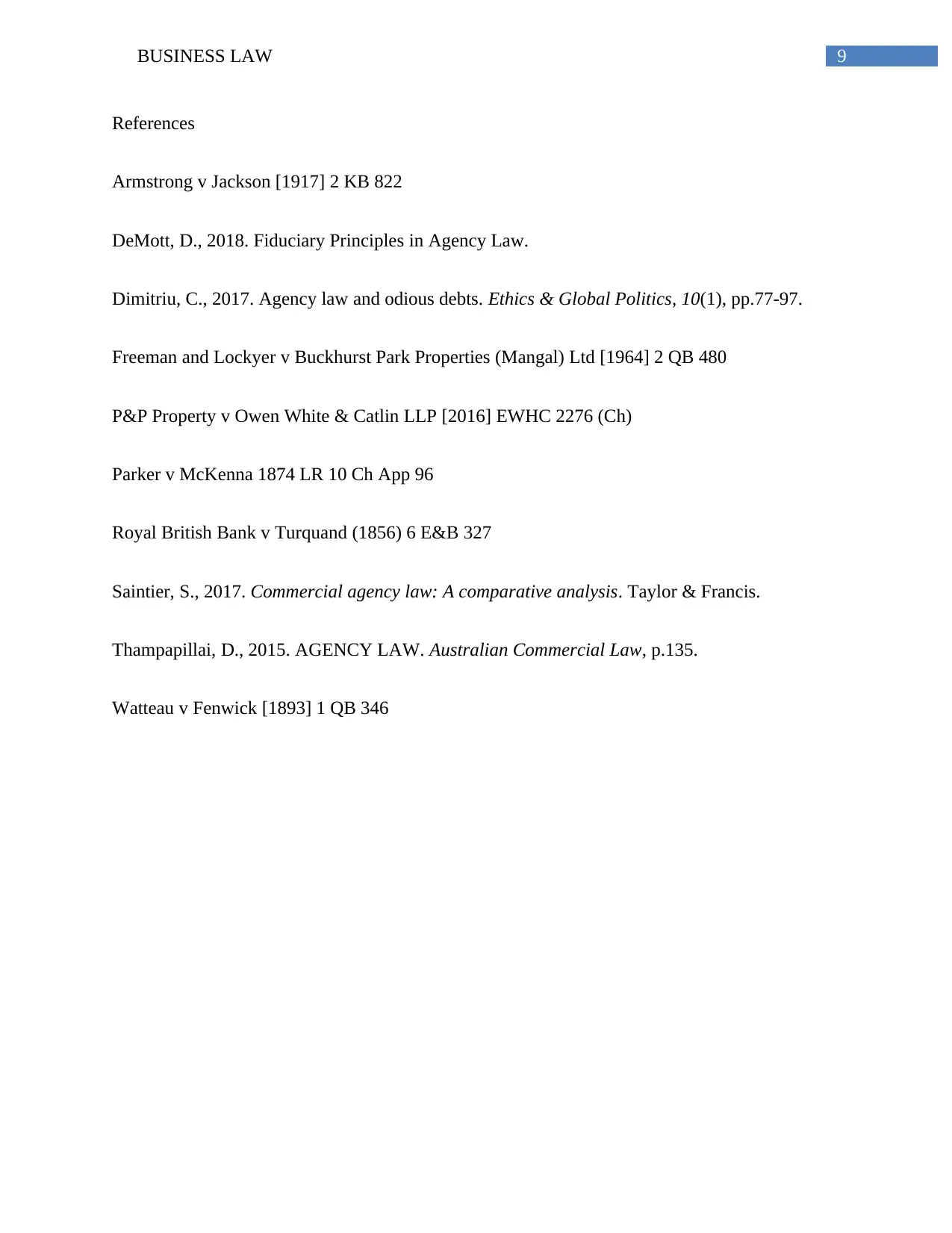
9BUSINESS LAW
References
Armstrong v Jackson [1917] 2 KB 822
DeMott, D., 2018. Fiduciary Principles in Agency Law.
Dimitriu, C., 2017. Agency law and odious debts. Ethics & Global Politics, 10(1), pp.77-97.
Freeman and Lockyer v Buckhurst Park Properties (Mangal) Ltd [1964] 2 QB 480
P&P Property v Owen White & Catlin LLP [2016] EWHC 2276 (Ch)
Parker v McKenna 1874 LR 10 Ch App 96
Royal British Bank v Turquand (1856) 6 E&B 327
Saintier, S., 2017. Commercial agency law: A comparative analysis. Taylor & Francis.
Thampapillai, D., 2015. AGENCY LAW. Australian Commercial Law, p.135.
Watteau v Fenwick [1893] 1 QB 346
References
Armstrong v Jackson [1917] 2 KB 822
DeMott, D., 2018. Fiduciary Principles in Agency Law.
Dimitriu, C., 2017. Agency law and odious debts. Ethics & Global Politics, 10(1), pp.77-97.
Freeman and Lockyer v Buckhurst Park Properties (Mangal) Ltd [1964] 2 QB 480
P&P Property v Owen White & Catlin LLP [2016] EWHC 2276 (Ch)
Parker v McKenna 1874 LR 10 Ch App 96
Royal British Bank v Turquand (1856) 6 E&B 327
Saintier, S., 2017. Commercial agency law: A comparative analysis. Taylor & Francis.
Thampapillai, D., 2015. AGENCY LAW. Australian Commercial Law, p.135.
Watteau v Fenwick [1893] 1 QB 346
1 out of 10
Related Documents
Your All-in-One AI-Powered Toolkit for Academic Success.
+13062052269
info@desklib.com
Available 24*7 on WhatsApp / Email
![[object Object]](/_next/static/media/star-bottom.7253800d.svg)
Unlock your academic potential
Copyright © 2020–2026 A2Z Services. All Rights Reserved. Developed and managed by ZUCOL.





